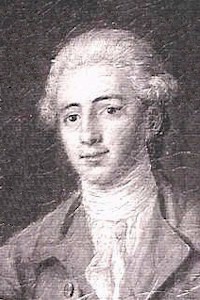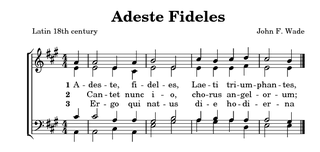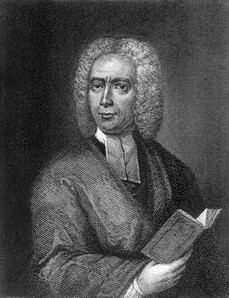Related Research Articles

A hymnal or hymnary is a collection of hymns, usually in the form of a book, called a hymnbook. They are used in congregational singing. A hymnal may contain only hymn texts ; written melodies are extra, and more recently harmony parts have also been provided.

"Love Divine, All Loves Excelling" is a Christian hymn by Charles Wesley, first published in 1747. It was initially published as part of his Hymns for Those that Seek and Find and quickly became a central hymn in both Methodist and wider Christian worship. The hymn reflects Wesley's teachings on Christian perfection, expressing a longing for God's transforming and sanctifying grace.

"A Mighty Fortress Is Our God" is one of the best known hymns by the Protestant Reformer Martin Luther, a prolific hymnwriter. Luther wrote the words and composed the hymn tune between 1527 and 1529. It has been translated into English at least seventy times and also into many other languages. The words are mostly original, although the first line paraphrases that of Psalm 46.

"For All the Saints" was written as a processional hymn by William Walsham How, who would later become the Bishop of Wakefield in the Church of England. The hymn was first printed in Hymns for Saints' Days, and Other Hymns, by Earl Nelson, 1864.

"Christ the Lord Is Risen Today" is a Christian hymn associated with Easter. Most of the stanzas were written by Charles Wesley, and the hymn appeared under the title "Hymn for Easter Day" in Hymns and Sacred Poems by Charles and John Wesley in 1739. The hymn eventually became well known for the "Alleluia" sung as a melisma after each line, which was added by an unknown author, probably to fit the commonly used hymn tune, "Easter Hymn". It remains a traditional processional hymn on Easter Sunday.

"All Hail the Power of Jesus' Name" is a Christian hymn.

A hymn tune is the melody of a musical composition to which a hymn text is sung. Musically speaking, a hymn is generally understood to have four-part harmony, a fast harmonic rhythm, with or without refrain or chorus.
Christianity is the predominant religion in Liberia, with Protestantism being its largest denomination. Liberia is a secular state and its constitution guarantees freedom of religion. While most Liberians have religious affiliations, traditional belief systems are widespread.

Loma is a Mande language spoken by the Loma people of Liberia and Guinea.
"Come Thou Almighty King" is a Christian hymn of unknown authorship, which is attributed to Charles Wesley by Victorian and Edwardian hymnologists, but whose authorship is predominantly stated as "anonymous" in modern hymnals.

Paul Speratus was a Swabian Catholic priest who became a Protestant preacher, reformer and hymn-writer. In 1523, he helped Martin Luther to create the First Lutheran hymnal, published in 1524 and called Achtliederbuch.

Delores Dufner is an American sacred music composer, librettist, and organist whose works have been included in Catholic hymnals in the United States, Canada, the United Kingdom and Australia. Dufner is a nun of the Order of Saint Benedict at Saint Benedict's Monastery in Saint Joseph, Minnesota. She is on the faculty of Saint Benedict's College and Saint John's University, Collegeville, Minnesota. In 1994, Dufner was commissioned to write the libretto for the oratorio Choose Life, Uvacharta Bachayim. "One of the best-known hymn writers in the church today. More than twenty different publishers have included her texts in their hymnals and hymn collections. In 2017 Dufner received the Christus Rex award from the Lutheran Valparaiso University.
Jane Laurie Borthwick was hymn writer, translator of German hymns and a noble supporter of home and foreign missions. She worked closely with her sister, Sarah Laurie Findlater. She published under the pseudonym: H. L. L.. Jane Laurie Borthwick is best known for the Hymns from the Land of Luther; her most famous translation today is Be still, my soul and her most known original text is Come, labor on. Like Catherine Winkworth and Frances Elizabeth Cox, she greatly contributed to English-language hymnody by mediating German hymnody.
Christopher Martin Idle is a British hymnodist.

Valerie Collison is an English organist and composer of hymns and carols. Her best-known work is "Come and Join the Celebration" for which she composed both the lyrics and tune. This was first published in Carols for Children in 1972 and is now performed in services throughout the UK. She also wrote "The Journey of Life", popular in English primary schools as part of the Come and Praise hymnal. She was born in Bromley and worked as a medical secretary.

"Gott ist gegenwärtig" is a Christian hymn in German by the Reformed writer Gerhard Tersteegen, published in 1729, based on a 1680 melody by Joachim Neander. The hymn, with the melody simplified, is part of the Protestant hymnal Evangelisches Gesangbuch as EG 165 and the 2013 Catholic hymnal Gotteslob as GL 387. Seven of its eight stanzas are part of the Mennonite hymnal as No. 1. The hymn is regarded as an expression of Christian mysticism. It was translated to English in various versions.
"Let us break bread together" is a traditional Christian hymn. Its melody is searching, simple, major key, and has simple lyrics.

In Our Day of Thanksgiving is a Christian hymn written in 1894 by the English hymnodist William Henry Draper. It was first published in The Victoria Book of Hymns in 1897, and appears in a number of current hymnbooks. The text of the hymn is about remembrance of the dead and is often sung on All Saints' Day or All Souls' Day, or for the dedication of a church.

"Alas! and Did My Saviour Bleed" is a hymn by Isaac Watts, first published in 1707. The words describe the crucifixion of Jesus and reflect on an appropriate personal response to this event. The hymn is commonly sung with a refrain added in 1885 by Ralph E. Hudson; when this refrain is used, the hymn is sometimes known as "At the Cross". The final line of the first stanza has attracted some criticism, as it leads the singer to call themselves a "worm". Hymnals often change the line from "for such a worm as I" to "for such a one as I" or "for sinners such as I".
References
- 1 2 3 4 5 6 7 8 C. MICHAEL HAWN/S T KIMBROUGH, JR. (with appreciation for information provided by Daniel W. Sopo). "Billema Kwillia." The Canterbury Dictionary of Hymnology. Canterbury Press. Web. 24 Feb. 2021. http://www.hymnology.co.uk/b/billema-kwillia.
- 1 2 "History of Hymns: "Come, Let Us Eat"". Discipleship Ministries. Retrieved 2021-02-24.
- 1 2 Marshall, Madeleine Forell (1995). Common Hymnsense. GIA Publications. pp. 164–170. ISBN 978-0-941050-69-2.
- ↑ "CGB152 Come, Let Us Eat". www.choristersguild.org. Retrieved 2021-02-24.
- ↑ "Handbell World | Come Let Us Eat Carter, J. Kwillia, B. | Handbell World". www.handbellworld.com. Retrieved 2021-02-24.